
Claiming lax state oversight of manure spreading is worsening Iowa’s water quality, a citizens’ action group presented detailed evidence Tuesday to the Iowa Department of Natural Resources (DNR) in an effort to persuade that regulatory body to stop issuing permits to hog confinements until it can start enforcing its own regulations.
About 50 members of Iowa Citizens for Community Improvement (ICCI) attended the one-hour meeting at the Iowa Statehouse, where they filed a complaint with the state department tasked with conserving and enhancing Iowa’s air, water and land resources. Because the complaint alleges violations of the U.S. Clean Water Act, a formal investigation by the DNR is now required by Iowa law.
The complaint outlined the findings of a ICCI study of manure management plans (MMPs) for 234 livestock operations in Adair, Boone, Dallas, Guthrie and Sac counties. Volunteers spent hundreds of hours compiling the far-flung data. The DNR does not maintain a publicly accessible online database of MMPs, so researchers sought them at county seats and DNR field offices. Some of the most crucial MMP documentation is confidential.
 “Our audit of manure management plans in five Iowa counties uncovered widespread inconsistencies and violations,” said ICCI’s Barb Kalback of Adair County, “including over-application of manure, manure-handling violations and incomplete or inaccurate manure management plans, all of which indicate a lack of DNR oversight.”
“Our audit of manure management plans in five Iowa counties uncovered widespread inconsistencies and violations,” said ICCI’s Barb Kalback of Adair County, “including over-application of manure, manure-handling violations and incomplete or inaccurate manure management plans, all of which indicate a lack of DNR oversight.”
In light of the findings, ICCI called on the DNR to place a moratorium on permits for new or expanding animal feeding operations.
There are currently about 9,000 livestock operations in Iowa, according to DNR estimates, and about 6,500 are large enough to require an MMP. Hogs compose the majority of the state’s livestock population. As the nation’s leading pork producer, Iowa currently produces about 21.6 million hogs each year, and the hogs in turn produce more than 10 billion gallons of liquid manure.
“Through this analysis,” Kalback said, “we have come to the conclusion that there is too much manure in Iowa, that the DNR does not have the will or capacity to handle this polluting industry and that no more factory farms should be built in Iowa. We are asking you, the DNR, to respond to our complaint with tough enforcement action, Clean Water Act permits and more producer accountability.”
“The DNR does not have the will or capacity to handle this polluting industry” –Barb Kalbach
Slipshod DNR record keeping was the focus of Boone County resident Jan Danilson’s remarks to the DNR. Danilson lives less than one mile from a 3,300-head hog confinement to the south and a 2,480-head confinement to the west.
“We do not want these hog factories or any more CAFOs to be built in Boone County,” Danilson said. She said the DNR database for the five counties surveyed by ICCI showed a total of 325 animal feeding operations, but ICCI’s request for the MMPs for these production facilities yielded only 234 manure plans. Their request even brought them MMPs for feedlots not found in the DNR database.
“These significant discrepancies suggest that the DNR is not keeping accurate records on these environmentally hazardous facilities,” Danilson said. “How can your agency monitor where manure’s applied if 92 manure management plans are missing in just five counties in Iowa? How many more are missing throughout the state then?”
 She said the DNR cannot adequately monitor farmers’ compliance and deter their violations of application regulations if it cannot track their manure in the first place.
She said the DNR cannot adequately monitor farmers’ compliance and deter their violations of application regulations if it cannot track their manure in the first place.
“You answer to all Iowans whose water is impaired and increasingly threatened by runoff and spills from these livestock confinements,” Danilson said. “How can Iowans trust that the DNR can effectively regulate them when it appears that you can’t even effectively record them?”
Claiming “the DNR approval process is seriously flawed,” Stacy Hartmann of Dallas County said the ICCI study “found widespread instances of unaccounted-for nitrogen. Is it any wonder that so many Iowans are skeptical of our state’s voluntary Nutrient Reduction Strategy when the DNR is not accounting for or managing nutrients in this regulated sector of livestock confinements?”
The ICCI audit uncovered “a variety of missing documents and insufficient data,” said Hartmann, who operates a direct-market vegetable farm with her husband near Minburn. Her remarks centered on gaps and obscurities in the MMPs that make verifying compliance with nutrient limits impossible.
“If so many fundamental components of just this small sample of plans are incorrect or missing outright,” Hartmann said, “how can we feel confident that these plans are being evaluated by the DNR? If so many basic and easily checked elements are being overlooked, then how do we know you check the more complex elements, like the numerous calculations or all the pages related to the P Index? In short, how can Iowans trust that your agency is on top of this?”
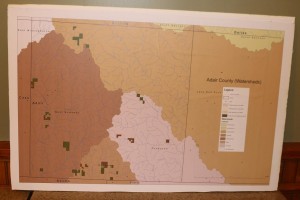
Janet Zimmerline of Adair County drew listeners’ attention to the issue of “double-dumping” or over-application of manure. She said ICCI’s cross-referencing of MMPs found numerous instances in which multiple producers were claiming the same field as part of their MMP. In Adair County, for example, “four producers were dumping on this little section,” she said, pointing to the map.
“Who would be the wiser if they were doing this?” Zimmerline said. “I’m betting the DNR does not even review the manure management plans, let alone cross reference them, because you have to cross reference them to find it. Nevertheless, the DNR needs to double-check any field that receives manure from more than one operation to see that maximum application levels are not being exceeded.”
The legal practice of spreading manure on highly erodible land was the object of Sac County resident Rosie Partridge’s comments, with particular emphasis on the role of phosphorus in the statewide rise of algal blooms and the resulting impairment of biodiversity, as in Black Hawk Lake near her home.
“The irony of this situation,” Partridge said, “is that the Iowa DNR is, on the one hand, spending money and using its expertise to cleanup targeted watersheds like Black Hawk Lake and, on the other hand, approving manure management plans that worsen the situation. This makes no sense.”
She challenged the DNR to act decisively.
“The water-quality issue in Iowa is at a crisis stage,” Partridge said. “None can be proud of the condition we’ve allowed our waters to reach. The large multi-corporate livestock industry continues to grow, while in many ways the state acts as if this huge industry will self-monitor. Meanwhile, Iowa’s impaired waterways grew 15 percent in just two years, to 725. I do find it shocking that manure management plans do so little to curtail the ongoing and worsening problem.”
Danielle Wirth, a professor of environmental science and policy at Iowa State University who lives along the Des Moines River in Boone County, said Iowa’s land forms and the state’s surface and subsurface water patterns make nutrient contamination from farm runoff virtually unavoidable.
Wirth cited the Des Moines Water Works’ increasingly expensive efforts to remove nitrates from its drinking water and the city of Boone’s nitrate emergency last summer, when it temporarily directed customers of the municipal water system to buy bottled water.
“Geological and hydrological features in these counties make them unsuitable to withstand the current industrial processes used to manufacture hogs and the corn and soy that feed them,” she said.
“Clearly, Iowa’s regulatory standards do not protect her citizens,” Wirth said. “Given the evident examples of geology, regulatory insufficiency, human greed, it is inconceivable that clean water for humans, native wildlife and native plants can be kept safe when CAFOs are constructed in this system.”
Wirth finished by asking pointed questions of the DNR: “How long must we subsidize with our taxes actions by the reckless and greedy that cause our waters to be poisoned? Why don’t we regulate hog excrement by the same scientific pollution-prevention standards that we use to regulate municipal waste water treatment systems?”

Before yielding the floor to the DNR for its response, Kalbach made some final remarks and listed several demands ICCI was making in light of its discoveries.
“Our findings shed light on a serious problem that is damaging the environmental health of our state and the quality of life for Iowans, namely, an inadequate inspection and enforcement program for livestock confinements at the Iowa DNR,” Kalbach said. “Through our research and audit, it is clear the Iowa DNR lacks the will and capacity to inspect and enforce manure management plans and the manure application. This lack of oversight is extremely concerning given the size and scope of this industry.”
ICCI called for tougher DNR enforcement of Clean Water Act provisions, online public access to MMP records, more robust training of DNR and county-level agents and stricter and more frequent on-site inspection of feeding operations. Meeting the demands would require enlarging the capacity of the DNR staff.
“Until the DNR builds that capacity, a moratorium should be placed on approving any future or expanded factory farms,” Kalbach said. “Until this is complete, the DNR should not issue a single permit to a new or expanding facility, because we have uncovered a problem.”
Hearing details of the ICCI complaint for the first time, the DNR was not prepared to give detailed answers to the claims. DNR Director Chuck Gipp referred technical questions to DNR Field Office Supervisor Ken Hessenius, who claimed the DNR thoroughly inspects MMPs and also conducts complete on-site inspections.
He said the DNR staff is adequately trained in the inspection and oversight of MMPs but admitted the department does not have enough personnel to meet the ICCI demands for application monitoring.
“Frankly, to do a lot of what you want us to do, we simply would not have the number of staff to do that,” Hessenius said, who works out of DNR Field Office 3 in Spencer. “We can’t have a person at every quarter-section 24 hours a day, 365 days a year.”
Hessenius was also skeptical about ICCI’s claims of DNR database gaps and missing MMPs.
“I would seriously doubt we’re missing 91 manure management plans,” he said, adding that many animal feeding operations in Iowa must include an MMP as part of their application for a DNR construction permit, but open-air feed lots of fewer than 1,000 animal units and closed confinements of fewer than 500 animal units are exempt from the requirement.
In Iowa law, one animal unit basically equals one 1,000-pound cow, 2.5 mature swine or 30 egg-laying hens.
Gipp, in his third year as DNR chair, also challenged ICCI claims that feedlot operators are “double-dumping” or over-applying manure. He said there is “nothing precluding producers from using the same ground as far as their manure management plans. What they are precluded from doing is over-applying with a combination of both. They can’t double-dump, as you refer to it.”
Hessenius also said livestock manure is a valuable commodity. It “wouldn’t make economic sense” for multiple operators to apply manure to the same ground, he said, as in the case in Adair County where four operators allegedly spread manure.
Speaking to the other ICCI demands, Gipp said bringing about online public access to MMP records, including manure application records, which Iowa law currently treats as confidential, will take action from the state legislature.
“Some of the things you’re concerned about are things that we don’t have the ability to do under current law,” he said. “It will take legislation to do that. We’re statutorily limited.”
Gipp said the legislature’s original purpose in creating manure management plans was “to reduce the concentration of animal livestock confinements. If you control how they apply the manure, you control the concentration.”
DNR records show permit applications for new or expanded livestock confinements have exceeded 300 a year for the past five years, leading some observers to claim the MMP concept has failed in its intended purpose.
After the meeting, Gipp said he “didn’t hear anything new today” yet was “very pleased with the tenor of the meeting. Normally, some of these with ICCI involved becomes a yelling and screaming match” in which “it doesn’t seem they want to have a resolution. It’s more about making headlines and things like that. So I was pleased with the day. It was a good change.”
Adam Mason, ICCI staffer, also said he was pleased with the meeting and with the DNR’s willingness to address information on the spot.
“Of course, they’re going to make as many excuses as possible and then try to pass the buck back to the legislature,” Mason said. “This issue isn’t anything new. We’ve laid this out to DNRs in the past. What we really want to know is what’s the DNR going to do to fix the problem. We hear from folks all the time from all over the state who see this happening, factory farms dumping extra manure on fields. They really want the DNR to start cracking down, so we’re going to look for every avenue we can to make them do it.”
ICCI staffer Jess Mazour said, “We’re not going to let the DNR sweep this under the rug. We’re letting as many people know about our case study as possible. On Friday we’re meeting with the U.S. Environmental Protection Agency Region 7 officials, and on Nov. 16 Iowa DNR’s Environmental Protection Commission is coming to our house.”
Members of the Environmental Protection Commission will meet at the ICCI offices, 2001 Forest Ave. in Des Moines Nov. 16 from 6:30 p.m. to 8 p.m. The meeting is open to the public.









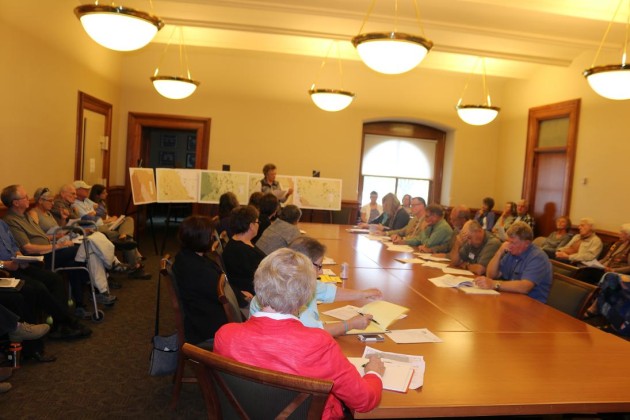
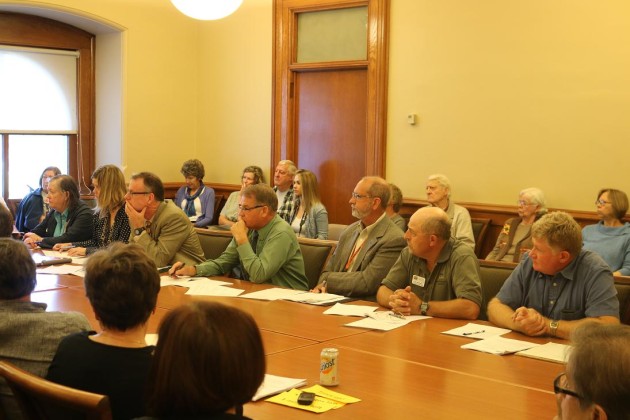


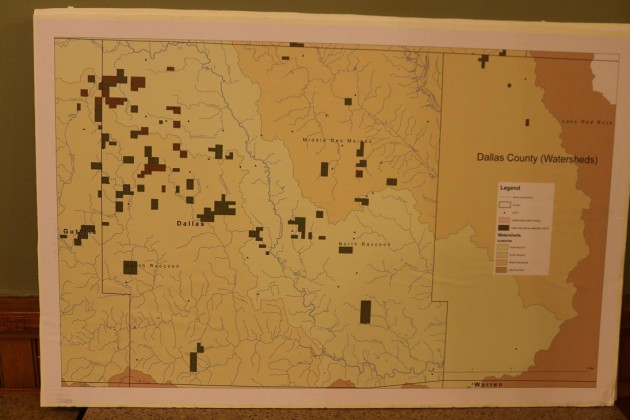
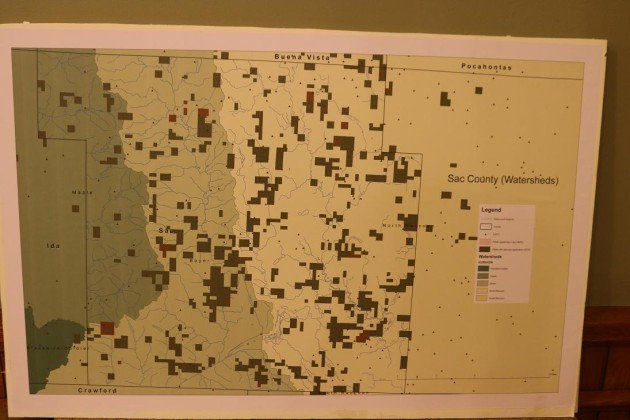
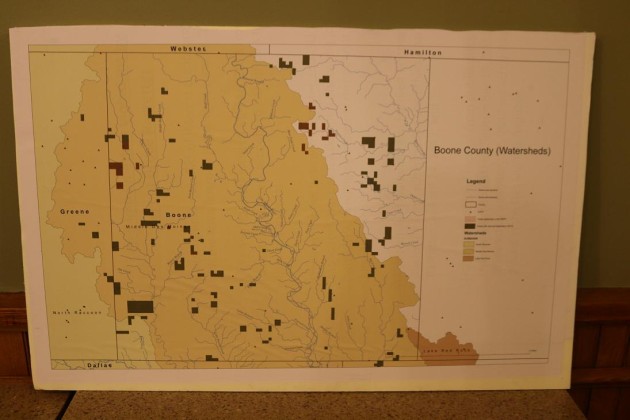

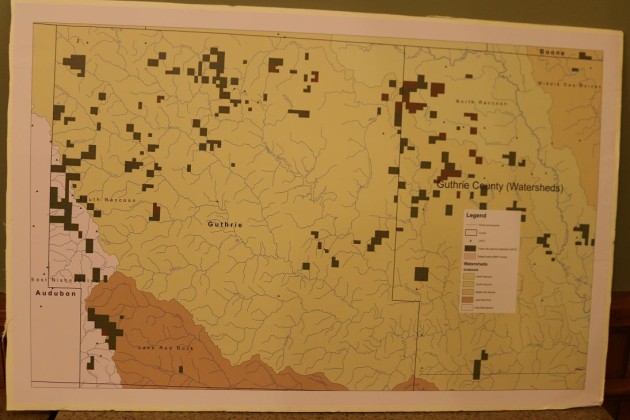








This is the best reporting of this issue I have seen. Thank you. Great information.
The proof is in the pudding. Ask the DNR what the phosphorus and nitrogen levels are in the Raccoon and Des Moines Rivers. If they answer truthfully, follow up with the question,” Where is the phosphorus and nitrogen coming from?” If you get a chance, ask: “Isn’t the expensive taxpayer-funded Nutrient Reduction Strategy suppose to reduce these levels?” and then, “Why isn’t it working?” Answer: “Some producers are not cooperating with the ‘voluntary’ plan.” Question: “Why is it voluntary? Cities, towns and citizens have to manage their waste products?” Unspoken answer: “Because it would cut into farmers’s profits.” Follow up: “So factories could make more money and citizens could save money by dumping their waste untreated into our rivers. What makes farmers so different from the rest of us?” Unspoken answer: “The Farm Bureau Federation.”
The apparent lack of will of the Iowa DNR to oversee these operations and enforce state and federal regulations is a prime example of why Libertarian models of government do not work. To quote the old cliche, “Greedy businessmen like weak government for the same reasons criminals like weak and ineffective police departments.”
I really hope they can make some headway in getting the DNR enforce the regulations.
The statement “manure is a valuable resource” may be true in areas where it’s scarce. But like anything else, if you have too much of it, the value drops quickly!
I am fairly new to Iowa. There is a small cattle and horse farm behind us. Perry government told us the owner has to remove twice a year. With 10 cows and 3 horses, there is A LOT of manure adds up. One pile is quite large that he added to last year. It has been there for three years. But the city told me they have to remove it twice a year. Someone is not doing their job. Or are they getting off for not acting on the issue? Now this spring he made another pile. The city still is NOT doing anything about it. The flies, the smell, the ground water? IS THERE NOT ONE PERSON THAT IS CONCERENED ABOUT THIS AND WILLING TO UPHOLD THE LAWS OF PERRY? I do not think I have ever been on this page.